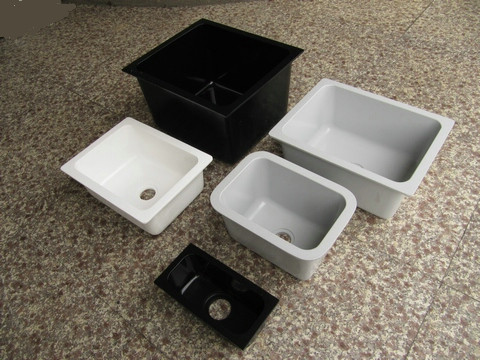epoxy resin sinks
Epoxy resin sinks have emerged as an indispensable asset across a diverse range of laboratory settings, owing to their exceptional chemical resistance, durability, and ease of maintenance. In the highly specialized and demanding realm of laboratories, the selection of equipment is paramount to ensuring safety, accuracy, and operational efficiency. This article delves into the unique applications of epoxy sinks in various laboratories, highlighting how these sinks cater to the specific requirements of each environment.

Chemical Laboratories: Withstanding Harsh Reagents
Epoxy resin sinks are the ideal choice for chemical laboratories, where a wide range of aggressive chemicals are used in reactions. From concentrated acids and bases to potent solvents, these substances can pose a significant threat to traditional sinks. However, epoxy resin sinks engineere to withstand these harsh conditions with remarkable resilience. The cross – linked polymer structure of epoxy resin forms a robust barrier that prevents chemical penetration and degradation. For example, when exposed to highly corrosive substances like sulfuric acid, hydrofluoric acid, or sodium hydroxide, epoxy sinks maintain their structural integrity. This ensures that the sink does not leach harmful substances into the waste stream or compromise the safety of laboratory personnel. These sinks also play a crucial role in waste disposal within chemical laboratories. The non – porous surface of epoxy resin prevents the absorption of chemicals, making it easy to flush away residues with minimal risk of contamination. Additionally, the seamless construction of epoxy resin sinks eliminates crevices where chemicals could accumulate, reducing the likelihood of unexpected reactions and facilitating thorough cleaning.
Biological Laboratories: Ensuring Hygiene and Contamination Control
In biological laboratories, where maintaining a sterile environment is essential, epoxy resin sinks offer significant advantages. Their smooth, non – porous surfaces are resistant to the growth of bacteria, fungi, and other microorganisms. This characteristic is particularly important when handling biological specimens, as it minimizes the risk of cross – contamination between samples.
After experiments involving biological materials, epoxy resin sinks can be easily sanitized using a variety of disinfectants. The sink’s chemical resistance allows it to withstand exposure to common laboratory disinfectants, such as bleach, alcohol – based solutions, and quaternary ammonium compounds, without being damaged. This ensures that the sink remains a safe and hygienic fixture in the laboratory, protecting both the integrity of research and the health of laboratory workers.
Analytical Laboratories: Precision and Cleanliness
Analytical laboratories, which rely on highly sensitive instruments for accurate measurements, demand equipment that is free from contaminants. epoxy resin sinks contribute to the maintenance of a clean and contaminant – free environment. Their non – porous surfaces do not release particles or residues that could interfere with analytical results, ensuring the reliability of experiments.
Furthermore, epoxy resin sinks can be customized to meet the specific needs of analytical laboratories. They can be equipped with features such as integral drainboards, specialized fittings for connecting to waste collection systems, and built – in sinks for rinsing glassware. These design elements enhance the functionality of the sink, making it easier to handle laboratory glassware and dispose of waste in a controlled manner.
Materials Science Laboratories: Handling Abrasive and Reactive Substances
Materials science laboratories often deal with abrasive materials, high – temperature processes, and reactive chemicals. epoxy resin sinks are well – suited to these challenging conditions. Their exceptional durability allows them to withstand the impact of heavy objects and the abrasion caused by abrasive materials, such as sandpapers or metal shavings.
In addition, epoxy resin sinks can resist the corrosive effects of chemicals used in materials synthesis and characterization, such as strong oxidizing agents and organic solvents. This makes them an ideal choice for washing equipment, cleaning up spills, and performing routine laboratory tasks without the worry of sink damage or chemical leakage.
Environmental Testing Laboratories: Robustness and Adaptability
Environmental testing laboratories analyze a wide range of samples, including water, soil, and air, which may contain various contaminants and pollutants. epoxy resin sinks are highly adaptable to the diverse needs of these laboratories. Their chemical resistance enables them to handle samples and reagents that may be acidic, alkaline, or contain hazardous substances.
Moreover, epoxy sinks can designe with large capacities to accommodate the washing of bulky sampling equipment and the disposal of large volumes of waste. Their ease of cleaning ensures that the sink can quickly prepare for the next round of testing, improving the efficiency of laboratory operations.
In conclusion, epoxy resin sinks have proven to be an invaluable asset in various laboratory settings. Their exceptional chemical resistance, durability, and ease of maintenance make them the ideal choice for handling the unique challenges and requirements of each type of laboratory. As laboratories continue to evolve and demand more from their equipment, epoxy sinks will undoubtedly remain a staple in laboratory design, contributing to the advancement of scientific research and experimentation.